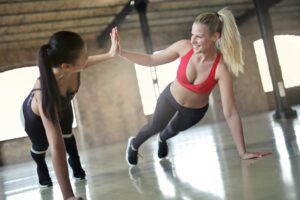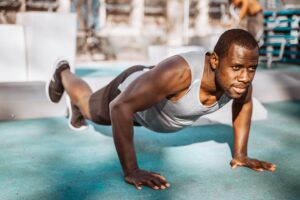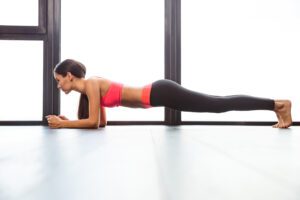Push-ups, a timeless and effective bodyweight exercise, are often associated with building upper body strength in men. However, push-ups offer a multitude of benefits for women as well, contributing to overall strength, muscle tone, and functional fitness. In this article, we’ll explore the advantages of incorporating push-ups into women’s fitness routines, dispelling myths and highlighting the empowering impact of this fundamental exercise.
The Myth of Push-Ups Being Only for Men
There’s a common misconception that push-ups are primarily a male-centric exercise. Some women may shy away from incorporating push-ups into their fitness routines due to the belief that it’s an exercise designed for building bulky muscles or that it’s too challenging for the female physique. In reality, push-ups are a versatile and adaptable exercise suitable for individuals of all genders and fitness levels.
The Benefits of Push-Ups for Women
1. Upper Body Strength:
Push-ups engage major muscle groups in the upper body, including the chest, shoulders, and triceps. For women, developing strength in these areas contributes to enhanced overall upper body function, making daily activities easier and promoting a balanced physique.
2. Core Activation:
A proper push-up involves maintaining a plank position, which requires significant core engagement. Strengthening the core muscles, including the rectus abdominis and obliques, not only contributes to improved posture but also aids in achieving a toned and defined midsection.
3. Shoulder and Back Toning:
Push-ups target the deltoids and muscles in the upper back, promoting shoulder stability and toning. Toned shoulders and back muscles not only contribute to a more sculpted appearance but also play a role in supporting good posture.
4. Functional Fitness:
Push-ups are a functional exercise, meaning they mimic movements used in everyday activities. As women often juggle a variety of physical tasks, from carrying groceries to lifting children, the functional strength developed through push-ups directly translates into increased capability in these activities.
5. No Equipment Required:
One of the key advantages of push-ups is that they require no special equipment. Whether at home, in a gym, or during a outdoor workout, women can perform push-ups virtually anywhere, making them a convenient and accessible exercise.
6. Versatility and Progression:
Push-ups offer a range of variations, allowing individuals to tailor the exercise to their fitness levels and goals. Beginners can start with incline push-ups or knee push-ups, gradually progressing to standard push-ups and more advanced variations as strength improves.
How to Start Incorporating Push-Ups
1. Mastering Form:
Proper form is crucial for the effectiveness of push-ups and to avoid unnecessary strain. Start with the basics: hands placed slightly wider than shoulder-width apart, body in a straight line from head to heels, and controlled movements throughout.
2. Incline Push-Ups for Beginners:
If standard push-ups feel challenging initially, begin with incline push-ups. Place your hands on an elevated surface, like a sturdy bench or a step, and perform push-ups with a controlled range of motion.
3. Knee Push-Ups:
Another beginner-friendly variation is the knee push-up. Start in a plank position with your knees on the ground, maintaining a straight line from head to knees. Perform push-ups with proper form, gradually working towards full push-ups as strength improves.
4. Consistency is Key:
Like any exercise, consistency is crucial for seeing results. Aim to include push-ups in your workout routine at least two to three times a week. Start with a manageable number of repetitions and gradually increase as your strength progresses.
Debunking Common Myths
1. Fear of Bulky Muscles:
One of the most pervasive myths is the fear of developing bulky muscles, especially in the upper body. In reality, women are less likely to develop significant muscle mass compared to men due to differences in hormonal profiles. Push-ups contribute to a lean and toned appearance rather than bulky muscles.
2. Perceived Difficulty:
While push-ups can be challenging, especially when starting, they are scalable to individual fitness levels. Starting with modified variations and gradually progressing allows women to build strength at a pace that suits their abilities.
3. Incompatibility with Femininity:
Associating push-ups with a lack of femininity is a misconception rooted in outdated stereotypes. Fitness and strength are empowering for women, and exercises like push-ups contribute to overall well-being without compromising femininity.
The Empowerment of Push-Ups for Women
Beyond the physical benefits, incorporating push-ups into a fitness routine can be an empowering experience for women. It goes beyond building physical strength; it’s about cultivating mental resilience, challenging preconceived notions, and embracing the full spectrum of one’s capabilities.
1. Building Confidence:
Successfully mastering push-ups, whether it’s achieving the first full push-up or progressing to advanced variations, builds confidence. The sense of accomplishment from conquering a challenging exercise transcends into other areas of life.
2. Mind-Body Connection:
The mind-body connection established through push-ups is empowering. Being attuned to your body’s capabilities, setting goals, and witnessing progress fosters a positive relationship with physical activity and one’s own strength.
3. Breaking Stereotypes:
By embracing exercises like push-ups, women challenge stereotypes and redefine societal expectations. The acknowledgment that strength training is beneficial and empowering for women contributes to a more inclusive and progressive fitness culture.
4. Functional Independence:
The functional strength gained through push-ups enhances women’s ability to navigate daily tasks independently. From lifting and carrying to maintaining stability in various movements, the carryover of push-up strength into everyday activities is profound.
In Conclusion
Push-ups are a valuable addition to any woman’s fitness routine, offering a myriad of benefits that extend beyond the physical. The empowerment derived from mastering this fundamental exercise contributes to a holistic sense of well-being. By dispelling myths, understanding the adaptability of push-ups, and appreciating their impact on both physical strength and mental resilience, women can harness the full potential of this empowering exercise. Whether a beginner or an experienced fitness enthusiast, the journey with push-ups is one of self-discovery, strength building, and empowerment.



